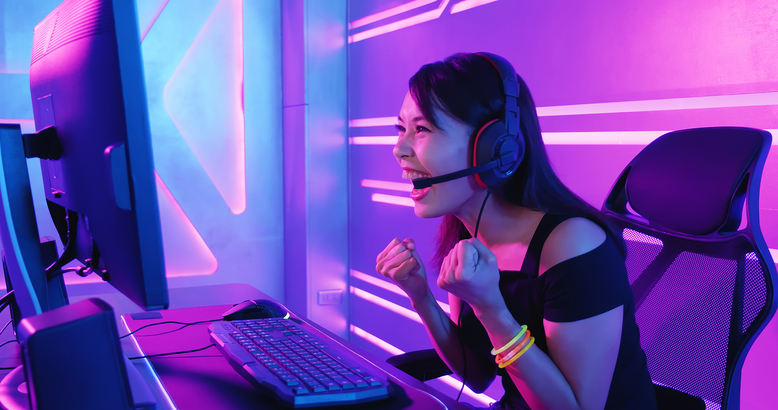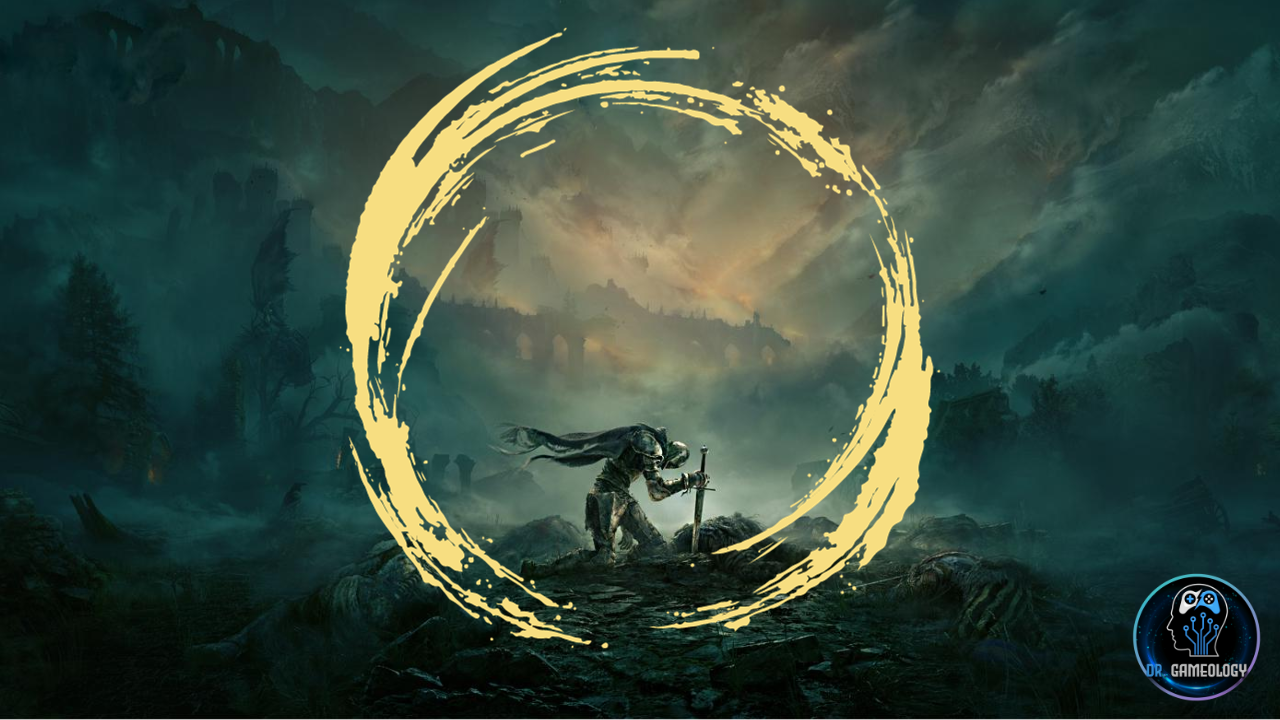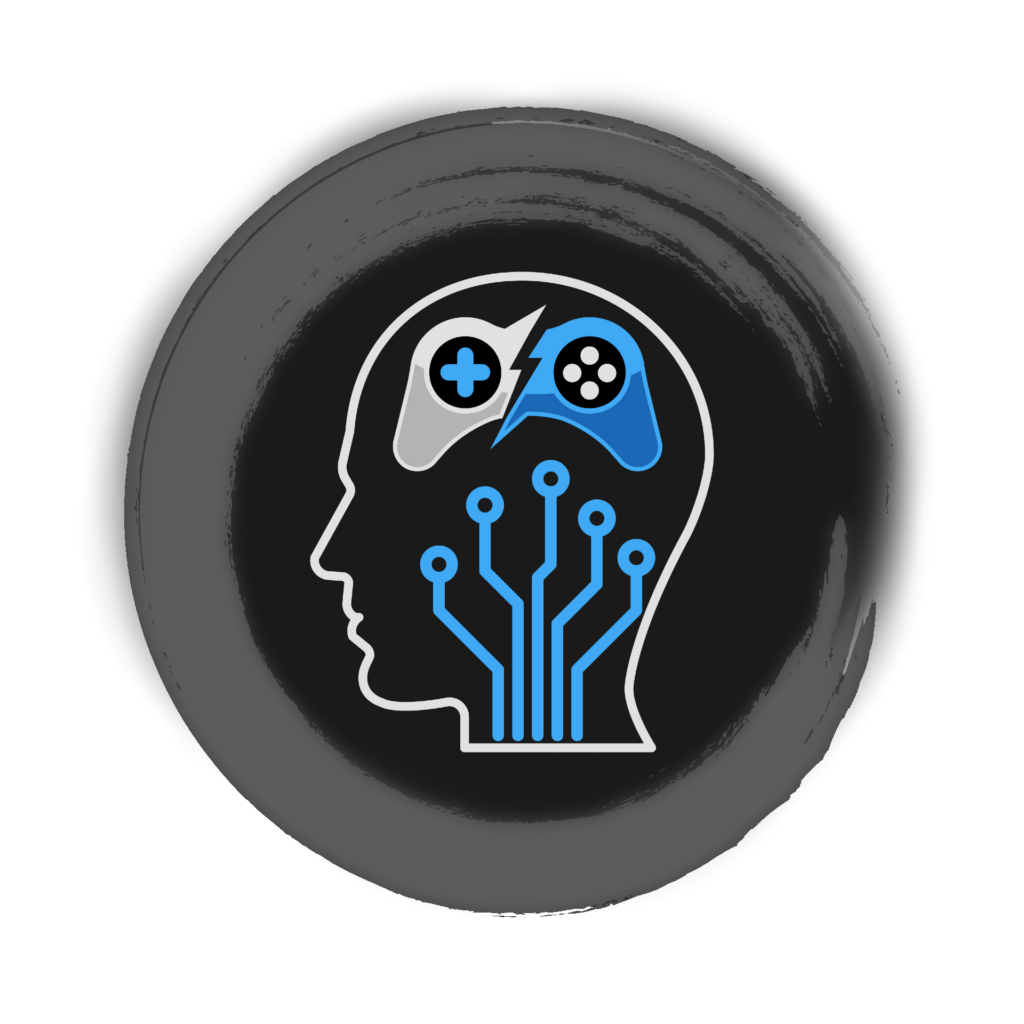Let’s talk about psychological flow and how it increases our sense of enjoyment when we play video games!
Have you ever been so absorbed in a video game that time just flew by and you lost track of the outside world? If so, you’ve experienced flow, a mental state of intense concentration and focus. Flow is often described as being “in the zone,” and it can be incredibly enjoyable. But what causes flow, and why do we feel it when playing games? This blog post will explore those questions using research on video games and psychology. Let’s begin by looking at the basic things we need in order to get this feeling: Challenge and Opportunity!
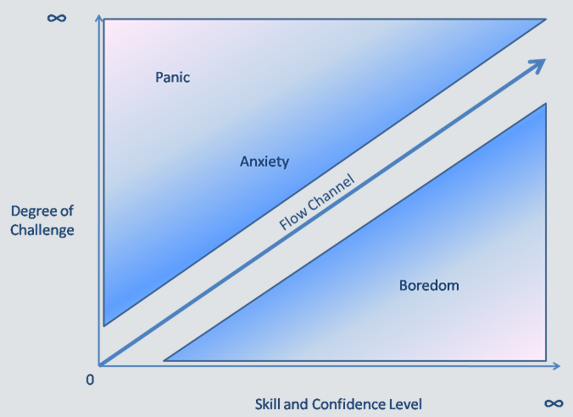
How does psychological flow improve productivity?
Psychological flow is a concept first described by Mihalyi Csikszentmihalyi, a Hungarian psychologist. Flow is an optimal state of consciousness in which people experience deep focus and immersion. When we are in a state of flow, we become completely absorbed in what we are doing and time seems to disappear. We are so focused on the task at hand that we don’t notice anything else. It is as if we are in a trance, with every part of the activity flowing out of our merged consciousness with our goal.
There are many different activities that can induce flow, but video games are particularly good at it. This is because video games are designed to provide just the right amount of challenge and opportunity. If a game is too easy, we become bored; if it’s too hard, we become frustrated. However, if a game is just challenging enough to keep us engaged, while also providing opportunities for mastery, we enter a state called the FLOW CHANNEL.
The flow channel occurs when our skill level is perfectly matched with the challenge of the task at hand. This balance between challenge and skill creates a sense of focus and absorption that allows us to lose track of time and become completely immersed in the game. When we are in the flow channel, we feel a sense of joy and satisfaction. Nothing else seems to matter except for the game.
How do video games create an environment that can induce flow?
So how can we use this information to improve our productivity? By understanding that we are more likely to enter a state of flow when the challenge is perfectly matched to our skill level, we can structure our tasks in such a way that will make it more likely for us to enter the flow channel.
Easy Mode
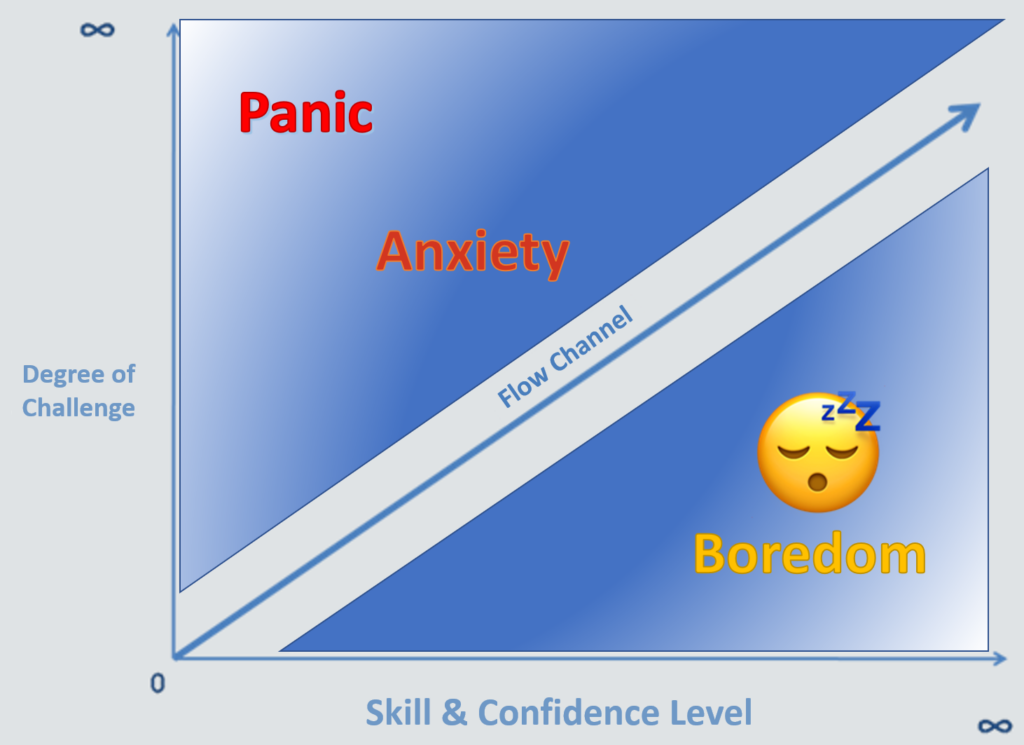
If a task is too easy, we can make it more challenging by setting higher goals. For example, if we’re playing a game on “easy mode,” we can try to beat it on “hard mode” instead. This will increase the challenge and make it more likely for us to enter a state of flow.
Hard Mode
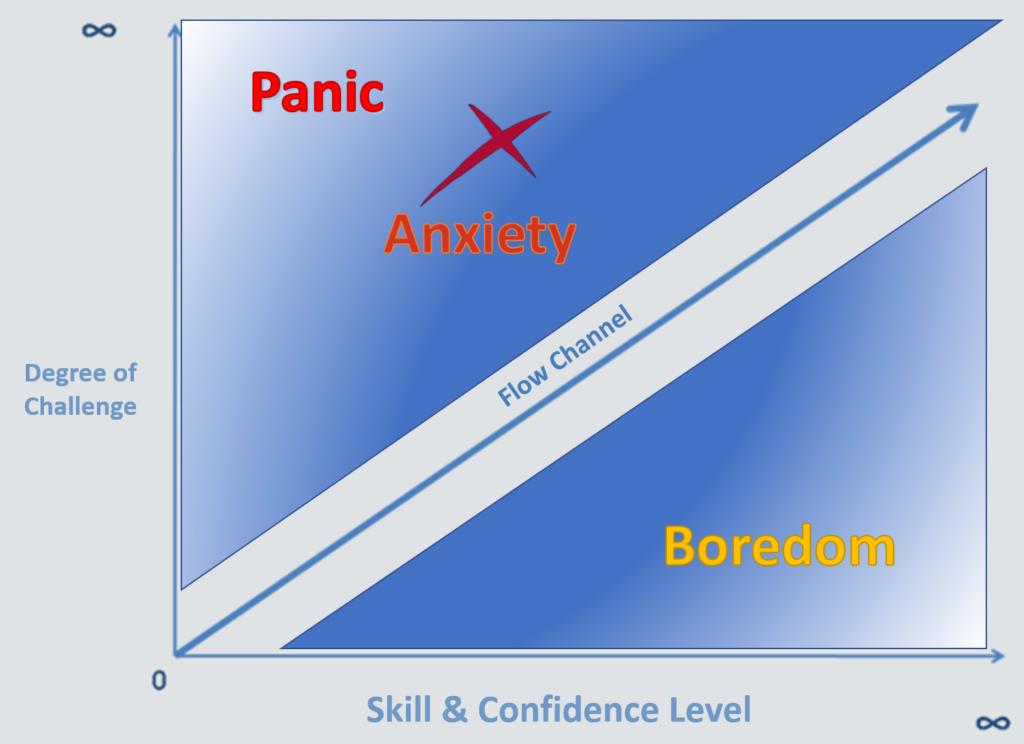
Conversely, if a task is too challenging, we can make it easier by breaking it down into smaller goals. For example, if we’re having trouble completing a level in a video game, we can try to complete it one section at a time. By breaking the task down into smaller goals, we make it easier and more manageable, which makes it more likely for us to enter a state of flow.
Panic Mode
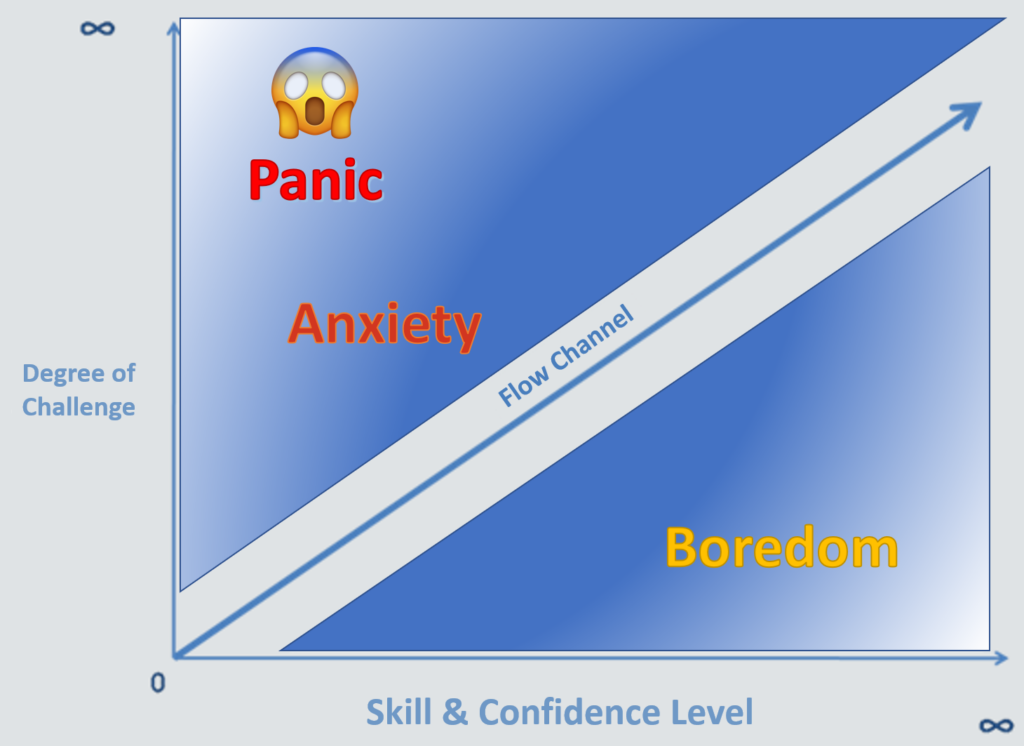
When a goal is too difficult to even begin trying, this can induce a panic state. When this happens, we still benefit from slowing down our thoughts, focusing on our breathing, and finding a path to begin believing in ourselves again. We cannot get back into the work unless we simplify the goal so we can get back to developing our abilities so that we can take small steps forward even when the challenges are difficult.
Learning Mode
If we need to be in a different spot on the flow chart, there is a simple list we can use to get back to basics and tap into our learning mode. These are:
- If we are bored, turn up the difficulty. Try something harder so the success becomes more fulfilling.
- If we are anxious, keep things simple by lowering the difficulty temporarily so we can work on getting better at handling the situation.
- Once we stabilize our anxiety, increasing our skill will help has succeed in the situation the next time we get to experience it.
- If we are panicking, focus on the smallest thing in the room that gives us a chance to do one simple thing better. If we cannot find something, find something we can imagine would work with a minor adjustment. A lot of the time, we first have to believe things can happen before they begin moving in that direction.
- When we find a balance, keep moving forward until we feel the perfect balance of flow in our actions.
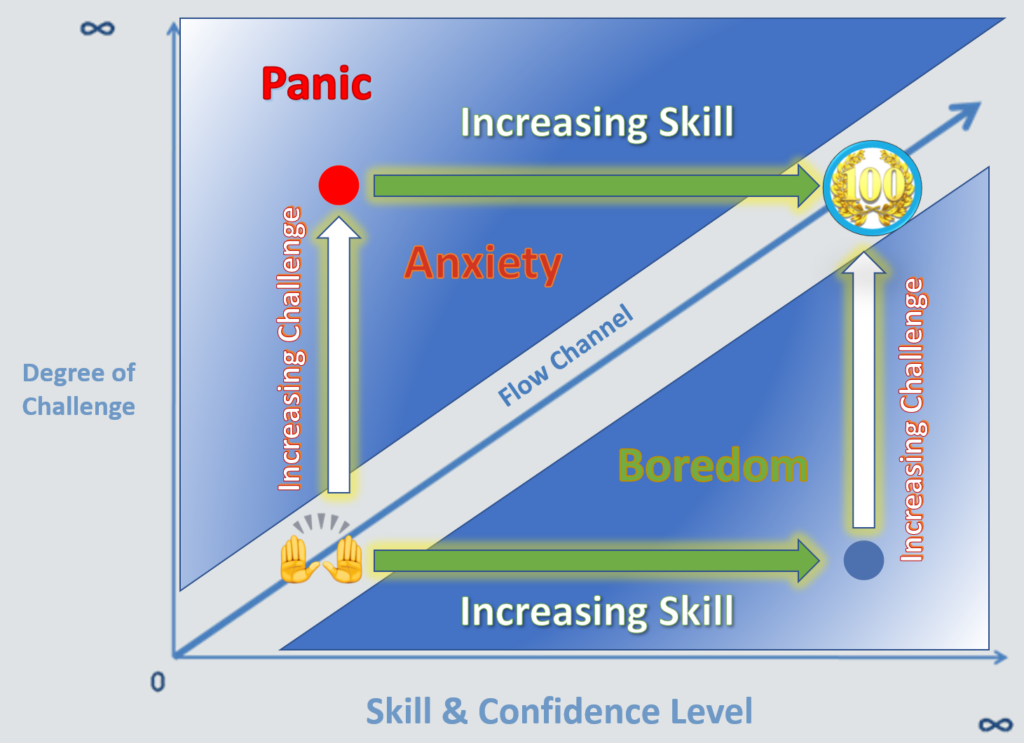
Video games that showcase psychological flow
Over the years, many different genres and game titles have offered unique opportunities to players which allows for a version of flow to occur in the play of the game. Even something as simple as a game of Solitaire can offer opportunities for flow if the player is striving for speed or perfection. Examples of this include:

Puzzle Games:
Tetris, Bejeweled, or Candy Crush
Games focusing on simple tasks and finding solutions to a constant flow of challenge

First-Person Shooters:
Halo, Call of Duty, or Counter Strike
Games with 1st person gameplay, often in competitive or team-oriented settings

Rhythm Games:
Guitar Hero / Dance Dance Revolution
Games with music /reaction based challenges to complete a skill-based sequence at tempo
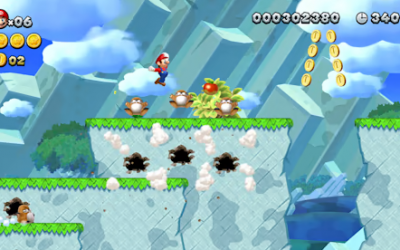
Platformers:
Super Mario Bros., Metroid, or Mega Man
Gaming focused on running and jumping to reach the end of levels and defeat enemies

MMOs:
World of Warcraft / Final Fantasy XIV
Immersive virtual worlds focused on use of created avatars to complete quests

Souls Style:
Elden Ring / Dark Souls
Involves high levels of difficulty succeeding through grit and mastery of gameplay
The key is that the game provides just the right amount of challenge while also offering opportunities for mastery. When this balance is struck, it creates a sense of focus and absorption that allows us to lose track of time and become completely immersed in the game. This state of flow is what leads to the feeling of joy and satisfaction that we experience when playing video games.
What are the benefits of finding psychological flow in our games?
While all video games have the potential to induce flow, some games are better at it than others. Games that are particularly good at inducing flow state typically have the following features:
- Clear goals and objectives
- Rules for play
- Immediate feedback
- Voluntary participation

When games provide clear objectives and rules, give immediate feedback, and allow players to feel a sense of control over their game environment, magical transformations occur in our ability to lock into the play opportunities at our fingertips.
This helps us to understand what we need from our tasks in life so we can level up our abilities in a powerful way. We can use this knowledge to improve our productivity by making sure that the tasks we set for ourselves have the perfect balance of challenge and skill. By structure our tasks in such a way, we can make it more likely for us to enter the flow channel and achieve our goals. We often may need to make a mental space where it is okay for us to train our skills up and become better. Likewise, we may need to do more difficult things at a certain point so our purpose continues to grow just as we grow across our lifespan.

In addition, research has shown that flow can also lead to higher-quality work. So not only are we getting more done when we’re in a state of flow, but it’s also likely to be better quality work. We don’t always have to settle for the simple goals, but we also learn form games to measure our challenges and understand when we are ready to step forward and accept our next challenge. It becomes worth the risk of our time and energy when we feel certain we will be able to exist in the flow channel of our lives.
How can we find psychological flow in our everyday lives?
When we’re in a state of flow, we’re completely focused on the task at hand and we’re not easily distracted. This can lead to improved productivity as we’re able to get more done in a shorter period of time. If we fail to reach this state, it is likely to cause negative feelings such as anxiety, panic, boredom, or even depression. Flow is intrinsically reinforcing, meaning we want to go back to the activities that let us achieve it.
In order to find psychological flow in our everyday lives, we need to identify the activities that offer us the right balance of challenge and skill. For some people, this may mean taking on a new hobby or learning a new skill. Others may find that they need to mix up their routine by trying new things or setting different goals. The important thing is to experiment and find what works for you.
It’s also important to remember that flow is a state of mind, not a destination. Flow is something that we enter into and exit out of on a regular basis. The goal is not to achieve flow and then stay there forever. Instead, the goal is to learn how to enter into flow more frequently so we can make the most of our time and energy.
So, as it turns out, the principles of flow that we experience in our favorite video games can also be applied to real life. When we’re focused and not easily distracted, we’re more productive. And if a task is too challenging, we can make it easier by breaking it down into smaller goals. Next time you feel like you’re stuck in a productivity rut, try incorporating some of these gaming techniques to help get yourself into a state of flow. Do you notice any flow experiences in your gaming life? Let us know on social media and our next live stream, and as always…
Continue the Journey!


